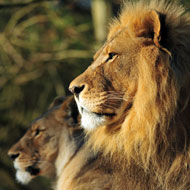Cecil’s son, Xanda, 'killed by trophy hunter'

Professional ‘big game’ trophy hunters shoot large animals or game in return for huge sums of money to fund conservation efforts.
Cecil the lion's son, Xanda, has been reportedly shot on a trophy hunt.
According to BBC News, Xanda is said to have died outside the Hwange National Park in northern Zimbabwe. He is six years old and a father to several young cubs.
A professional hunter is said to have reported the death to the authorities. However, it is not yet know who paid to shoot him.
The news comes two years after dentist Walter James Palmer from Minnesota, USA, sparked international outrage by shooting Cecil - a major tourist attraction - outside the same park.
Responding to the news, Born Free Foundation co-Founder and actress, Virginia McKenna OBE, said:
“Another trophy hunting horror story from Zimbabwe. I am not alone, I am sure, in being utterly disgusted that Cecil the lion’s six-year-old son, Xanda (himself the father of cubs), has now also become a victim of this obscene pastime. It doesn’t matter that it was technically legal - please can the authorities act now.”
Her call was echoed by Jordi Casamitjana, head of policy and research at the League Against Cruel Sports, who said:
“As long as the importation of hunting trophies remains legal, entire families of lions are at risk of being exterminated by trophy hunters. The sad and senseless killing of Xanda, Cecil the lion’s six-year-old son is a stark reminder that this risk is very real.
“Taking place just ten days after the US Government decided to lift the ban on lion trophies from Zimbabwe, Xanda’s tragic death should be a wake-up call to the authorities of the countries still allowing the importation of hunting trophies.”
Professional ‘big game’ trophy hunters shoot large animals or game in return for huge sums of money to fund conservation efforts.
It is believed that Mr Palmer was paid $50,000 to hunt Cecil, who was later beheaded and skinned.



 The BSAVA has opened submissions for the BSAVA Clinical Research Abstracts 2026.
The BSAVA has opened submissions for the BSAVA Clinical Research Abstracts 2026.